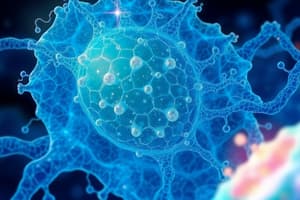Podcast
Questions and Answers
What is the study of living organisms, including their structure, function, growth, evolution, distribution, and taxonomy?
What is the study of living organisms, including their structure, function, growth, evolution, distribution, and taxonomy?
- Biology (correct)
- Genetics
- Ecology
- Botany
Which biological process involves the conversion of light energy into chemical energy?
Which biological process involves the conversion of light energy into chemical energy?
- Metabolism
- Growth and Development
- Photosynthesis (correct)
- Respiration
What is the term for the ability of an organism to maintain a stable internal environment despite changes in the external environment?
What is the term for the ability of an organism to maintain a stable internal environment despite changes in the external environment?
- Evolution
- Ecology
- Metabolism
- Homeostasis (correct)
Which system is responsible for transmitting and processing information in an organism?
Which system is responsible for transmitting and processing information in an organism?
What is the molecule that contains the genetic instructions for an organism?
What is the molecule that contains the genetic instructions for an organism?
Flashcards are hidden until you start studying
Study Notes
Biology
Definition: The study of living organisms, including their structure, function, growth, evolution, distribution, and taxonomy.
Subfields:
- Botany: The study of plants and their interactions with the environment.
- Zoology: The study of animals and their interactions with the environment.
- Microbiology: The study of microorganisms, such as bacteria and viruses.
- Ecology: The study of the relationships between organisms and their environment.
- Genetics: The study of heredity, genes, and genetic variation.
Key Concepts:
- Cells: The basic units of life, consisting of a cell membrane, cytoplasm, and genetic material.
- DNA: The molecule that contains the genetic instructions for an organism.
- Evolution: The process of change in the characteristics of a population over time.
- Ecosystems: Communities of living and non-living things that interact with each other.
- Homeostasis: The ability of an organism to maintain a stable internal environment despite changes in the external environment.
Biological Processes:
- Photosynthesis: The process by which plants convert light energy into chemical energy.
- Respiration: The process by which cells generate energy from glucose.
- Metabolism: The set of chemical reactions that occur within an organism to maintain life.
- Growth and Development: The process of growth and change in an organism from birth to maturity.
Biological Systems:
- Nervous System: The system that transmits and processes information in an organism.
- Circulatory System: The system that transports oxygen and nutrients to cells and removes waste products.
- Immune System: The system that protects an organism from pathogens and disease.
- Digestive System: The system that breaks down and absorbs nutrients from food.
Biology
- Study of living organisms, including their structure, function, growth, evolution, distribution, and taxonomy.
Subfields
- Botany: study of plants and their interactions with the environment.
- Zoology: study of animals and their interactions with the environment.
- Microbiology: study of microorganisms, such as bacteria and viruses.
- Ecology: study of the relationships between organisms and their environment.
- Genetics: study of heredity, genes, and genetic variation.
Key Concepts
- Cells: basic units of life, consisting of a cell membrane, cytoplasm, and genetic material.
- DNA: molecule that contains the genetic instructions for an organism.
- Evolution: process of change in the characteristics of a population over time.
- Ecosystems: communities of living and non-living things that interact with each other.
- Homeostasis: ability of an organism to maintain a stable internal environment despite changes in the external environment.
Biological Processes
- Photosynthesis: process by which plants convert light energy into chemical energy.
- Respiration: process by which cells generate energy from glucose.
- Metabolism: set of chemical reactions that occur within an organism to maintain life.
- Growth and Development: process of growth and change in an organism from birth to maturity.
Biological Systems
- Nervous System: system that transmits and processes information in an organism.
- Circulatory System: system that transports oxygen and nutrients to cells and removes waste products.
- Immune System: system that protects an organism from pathogens and disease.
- Digestive System: system that breaks down and absorbs nutrients from food.
Studying That Suits You
Use AI to generate personalized quizzes and flashcards to suit your learning preferences.




